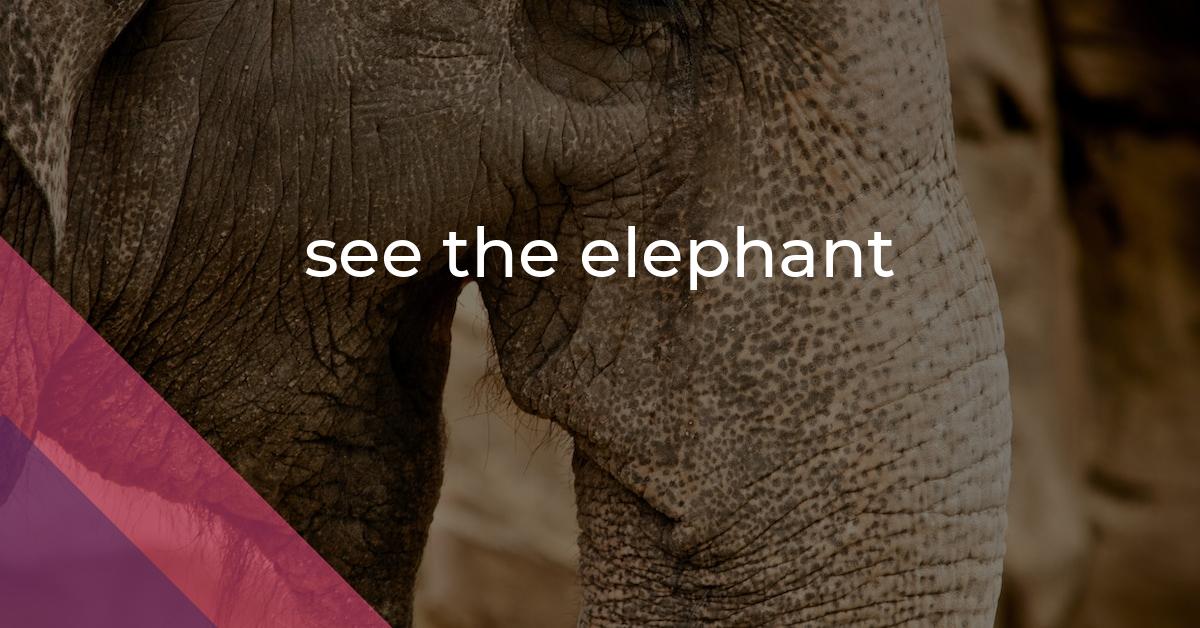see the elephant: Idiom Meaning and Origin
What does ‘see the elephant’ mean?
The idiom "see the elephant" means to experience something thrilling or unexpected, often with negative consequences or hardships.

Idiom Explorer
The idiom "see yellow" means to become angry or irritable, often due to a frustrating or annoying situation.
The idiom "see which way the cat jumps" means to wait and see how a situation develops before making a decision or taking action.
The idiom "see things" means to perceive or experience something in a particular way, often different from reality. It implies a subjective understanding or interpretation of a situation or event.
The idiom "see the trees through the forest" means to focus on small details and lose sight of the overall picture or main idea. This can happen when someone becomes too absorbed in the minor aspects of a situation and fails to understand the larger context or objective.
The idiom "see the light of day" means to be revealed or brought to attention after being hidden or kept secret for a period of time.
The idiom "see the light" means to finally understand or realize something, often after a period of confusion or ignorance.
The idiom "see the forest for the trees" means to be unable to see the overall picture or the big picture because you are too focused on the details or individual parts of a situation.
The idiom "see the dark side of the moon" refers to experiencing or witnessing the hidden or negative aspects of a person, situation, or thing.
Decoding the Elephant
The idiom "see the elephant" is a fascinating phrase that originated in the United States during the mid-19th century. It was commonly used amongst gold miners of the California Gold Rush. The phrase has a figurative meaning, representing the idea of encountering and experiencing something impressive or extraordinary. It can be traced back to the practice of traveling circus shows in America during the 19th century, where elephants were the main attractions. People would travel long distances to witness the grandeur and spectacle of seeing an elephant. Gradually, the phrase "see the elephant" transformed from its literal meaning to the metaphorical meaning of embarking on an adventurous or exciting journey.
This idiomatic expression is closely associated with curiosity, thrill, and the unknown. The word "elephant" in this context serves as a symbol of something extraordinary, mysterious, and potentially dangerous. People would willingly endure hardships and risks in order to have the chance to "see the elephant" and participate in an extraordinary experience.
Throughout history, the idiom "see the elephant" expanded beyond the context of the California Gold Rush and circus shows. It became a part of the American lexicon and found its way into literature, music, and political speeches. Its wider adoption further solidified its connotation of seeking out adventure, pursuing new experiences, and embracing the unknown.
In modern times, the meaning of the idiom "see the elephant" continues to evolve. People now use the phrase to recount personal stories of exploration and discovery, whether through literal travel or metaphorical journeys of self-discovery. It serves as a reminder of the inherent human desire to encounter the extraordinary and the lasting impact such encounters can have on one's life
The idiom "see things" is related to "see the elephant" in the sense that both idioms involve the act of seeing or perceiving something. While "see the elephant" is about encountering something extraordinary, "see things" is more about perceiving or noticing things that others may not see. It implies having a keen observation or being able to notice subtle details. Just as "see the elephant" encourages individuals to seize the opportunity to witness something extraordinary, "see things" urges individuals to pay attention and perceive things that may be overlooked by others.
The idiom "see the forest for the trees" is also related to "see the elephant". Both idioms touch upon the idea of gaining a broader perspective. "See the forest for the trees" suggests the importance of seeing the bigger picture and not getting lost or overly focused on small details. Similarly, "see the elephant" encourages individuals to embark on adventurous journeys to experience something extraordinary. Both idioms emphasize the significance of widening one's viewpoint and not allowing oneself to be consumed by small or insignificant aspects.
Example usage
Examples of how the idiom *see the elephant* can be used in a sentence:
- After years of dreaming about traveling to Africa, I finally had the opportunity to see the elephant in person on a safari.
- When I started working at the circus, I was excited to see the elephant up close and learn how to care for them.
- Going on a roller coaster for the first time can be intimidating, but once you've seen the elephant, you realize it's not as scary as it seems.
More "Adventure" idioms



